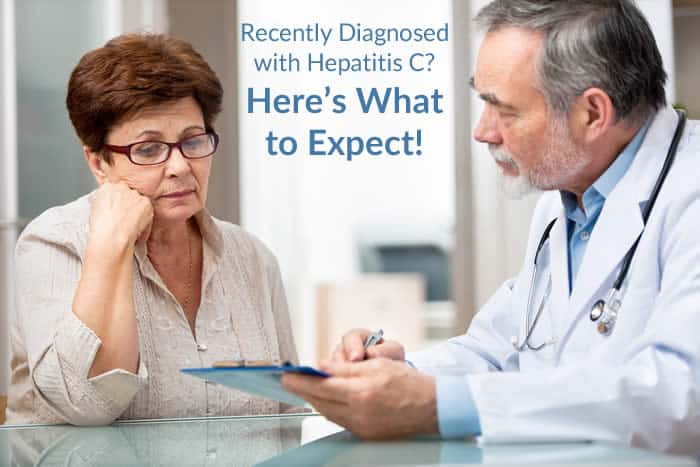Recently Diagnosed with Hepatitis C? Here’s What to Expect


Every year, roughly 1.5 million new cases of hepatitis C occur worldwide. (1) If you’re one of the individuals recently diagnosed with this disease, you may find that you have a lot of questions about what lies ahead. That’s completely normal. And getting a few answers can also help ease your mind. So, here’s what a hep C diagnosis means, as well as what you can expect.
What a Hepatitis C Diagnosis Means
Hepatitis C is a viral infection that occurs in the liver, leading to inflammation of this organ. Infection can be short-term, which is referred to as acute hepatitis C, or it can be long-term, which is known as chronic hepatitis C.
While symptoms of acute hepatitis C can last for six months, chronic hepatitis C is sometimes a lifelong disease—and many acute cases turn into chronic infections. (2) Chronic hepatitis C has the potential of turning into liver damage, liver scarring (cirrhosis), or liver cancer. For approximately 290,000 people annually, this virus leads to death (1).
Should I Be Worried If I Have Hep C?
Based on statistics such as these, you may be worried that a hepatitis C diagnosis is automatically a death sentence. However, that is not necessarily the case. Getting your diagnosis in the early stages of this disease, which also allows for early treatment, can help stop the virus from progressing to the point where it results in liver damage, failure, or cancer. (2)
Plus, the hepatitis C virus (HCV) can often be treated with antiviral medications. According to a 2018 review published in Liver International, interferon-free direct-acting antivirals have a 95% success rate for curing the hep C virus, with most treatments lasting 8 to 12 weeks. (3)
How Did I Get Hepatitis C If I Don’t Do Drugs?
Because the hepatitis C virus is spread through contact with infected blood, this disease is often associated with intravenous drug use or sharing needles with someone with HCV. But there are other ways to contract hep C.
They include:
- Coming in contact with needles used by someone with HCV in other ways, such as during your work as a police officer, first responder, or healthcare provider
- Sharing personal items with someone who has hepatitis C, or being exposed to the virus through any open sores they may have

- Getting a tattoo or piercing at a facility that does not use sterile equipment, potentially exposing you to the virus from a previous client infected with HCV
- Not using protection when engaging in sexual actions with someone who has hepatitis C
Women who are pregnant can also pass HCV onto their unborn child. This method of disease transference is increasing dramatically, largely due to the opioid epidemic, resulting in a higher rate of children between the ages of 2 and 3 being identified as having the virus. (X4)
Is Hep C Considered a Terminal Illness?
A terminal illness is an illness that does not have a cure and has a high likelihood of resulting in death. We’ve already talked about the research-based finding that 95% of people with this infection can be cured. According to a scientific update published in 2020, between 95% to 99% of people diagnosed with hepatitis C will survive this disease. (5) Thus, hepatitis C cannot be classified as a terminal illness.
The 2020 update also shares that 95% of people with chronic hepatitis C are unaware that they have the virus. This lack of awareness plays a major role in the ability of this disease to progress to more severe stages. It also makes testing and early treatment key to improving the prognosis of people who have HCV.
Tips for Better Coping with Your Recent Hepatitis C Diagnosis
Articles & Diet
If you’ve recently been diagnosed with hepatitis C, knowledge is power. Learn what you can about this infection so you understand exactly what it is and what to expect with your form of treatment. There are numerous informative articles available at Hepatitis Central to assist with this, covering everything from what hepatitis C is to tips for creating a liver-friendly diet.
Healthcare Provider
Also, talk to your healthcare provider. Ask them any questions you may have and share your concerns. This medical professional can help educate you about the disease while also setting reasonable expectations based on your specific condition and treatment.
Support Groups
It can also be helpful to connect with others who’ve been diagnosed with HCV, giving you the opportunity to learn from them and share your experiences. One option is the Hepatitis C Mentor and Support Group. You can also check with your local health department or do an online search for “hepatitis C support groups near me” to find other groups in your area.
Above all, remember that hepatitis C is highly treatable—especially in the early stages. So, follow your healthcare provider’s treatment advice and appear for all your necessary appointments. Taking these two actions can go a long way in helping you treat (and cope with) your recent hep C diagnosis.
(1) World Health Organization. (2022, June 24). Hepatitis C. Retrieved December 02, 2022, from https://www.who.int/news-room/fact-sheets/detail/hepatitis-c
(2) National Library of Medicine. (2021, March 03). Hepatitis C. Retrieved December 02, 2022, from https://medlineplus.gov/hepatitisc.html
(3) Asselah, T., Marcellin, P., Schinazi, R. (2018, February 10). Treatment of Hepatitis C Virus Infection with Direct-Acting Antiviral Agents: 100% Cure? Liver International. doi: https://doi.org/10.1111/liv.13673
(4) Kushner, T., Terrault, N. (2018, November 30). Hepatitis C in Pregnancy: A Unique Opportunity to Improve the Hepatitis C Cascade of Care. Hepatology Communications. doi: https://doi.org/10.1002/hep4.1282
(5) Stasi, C., Silvestri, C., Voller, F. (2020). Update on Hepatitis C Epidemiology: Unaware and Untreated Infected Population Could Be the Key to Elimination. SN Comprehensive Clinical Medicine. doi: 10.1007/s4399-020-00588-3







